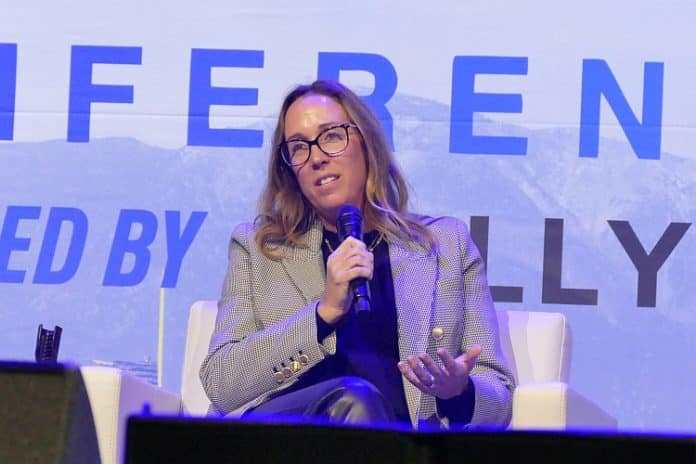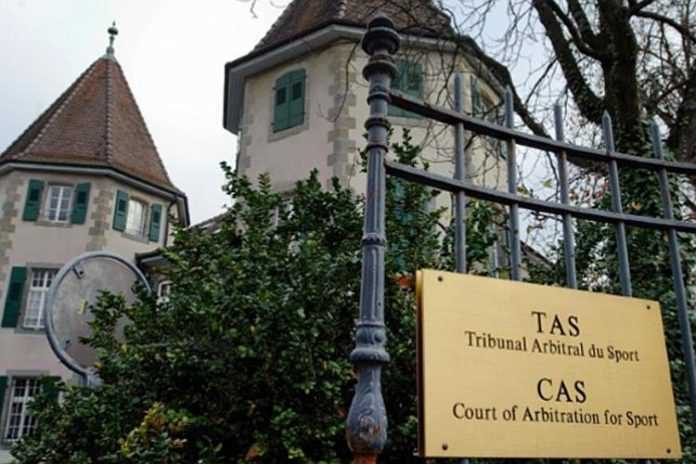★ The Sports Examiner: Surveying, monitoring and explaining the key competitive, economic and political forces shaping elite sport and the Olympic Movement.★
★ Want TheSportsExaminer.com insights for your team? Yes! Click here for info on speaking, research and consulting from editor Rich Perelman. ★
★ To get The Sports Examiner by e-mail: sign up here! ★
Los Angeles’s decades-long love affair with the automobile is well known, but according to the Los Angeles County Metropolitan Transportation Authority (known as Metro), the 2028 Los Angeles Olympic and Paralympic Games has to be the pivot point to more reliance on public transportation … or else!
That was the point made by Kasey Shuda, Metro’s Director for Construction Relations and Mitigation Programs and its Olympics Task Force, at Wednesday’s LA Sports Innovation Conference. Organized by the Los Angeles Sports Council, the program was held at the YouTube Theater at the Hollywood Park complex in Inglewood, California that includes SoFi Stadium, scheduled to be the site of the Opening Ceremony of the 2028 Olympic Games, as well as the archery competition.
During an afternoon panel on the “Impact of Sports in the L.A. Community,” Erikk Aldridge, the LA28 organizing committee Vice President, Impact, noted that in addition to continuing transit programs for events like Dodgers baseball games and NFL games at SoFi Stadium, mega-events coming to the Los Angeles area soon will include the College Football Playoff championship game in January, multiple matches for the 2026 FIFA World Cup and the 2028 Games. He asked:
“As you think about these large-scale events, and think about the community, is your head about to pop off, or is this like what you just do?”
Shuda was more than ready with her answer, providing a clear summary of what Metro wants to achieve via the 2028 Games (parentheticals added for clarity):
“I would say the Olympics is our biggest project yet. Ten miles of the subway is being built on Wilshire Boulevard, between Koreatown and [Olympic Village site] UCLA. Those are diverse communities, at every different station we’re constructing.
“So we’re out and about in the community doing projects, on a small scale. Now we have to connect them, so I think one of Metro’s biggest goals for the 2028 Olympic and Paralympic Games is making those connections, and forcing Los Angeles – including everyone in this room – to adapt to new mobility changes.
(Shuda is referring to the Purple Line extension along Wilshire, now under construction, that is expected to cost $8.2 billion for an 8.7-mile route and seven stations in three phases, expected to open in 2024, 2025 and 2027.)
“We all have to get out of our cars, and driving a Tesla does not count as helping the environment because you’re still in a single-use vehicle in a lane of traffic. So we have to think bigger, and with all of these sports events coming our way, we have an opportunity to test out and do pilot programs for shuttle bus systems. You know, we’re running some shuttle bus systems from the end of our [new, $2.1 billion K Line] here to SoFi. We have the amazing Dodgers Express, that is super-successful for Dodgers fans [from downtown L.A. and from Gardena].
“And so how do we take those small-scale, once-a-week opportunities and make them part of Los Angeles’s daily commute?
“And so we’re looking to do that by integrating Metro ticketing … with every ticket to a Dodgers game. So instead of driving to the Dodgers game, you already – with your ticket – paid $3 to ride Metro all day, that day for free. Same with SoFi: I’m also plugging, because I’m trying to get these guys to agree with this, to have integrated ticketing, where every time, you know what it says? Dodgers game, your ticket is coming up today; you can pay $60 to park, or you can take Metro for free.
“So how do we change people’s behaviors, and make those mode changes? That’s the only way we will survive the 2028 Olympic and Paralympic Games, and the only way we’ll change Los Angeles culture for the better.
“So one of Metro’s big things is leaving a legacy behind. So we’re not just going to build mobility hubs for the Games and them tear them down, and go back to business as usual, which is what happened in 1984. We need to more progressive, we need to think more of our children, the future of the climate and make these changes – and it’s going to be hard, it’s going to be hard on all of us – I still drove here by myself. Like, I’m not out here preaching, but we do have to think about how we’re going to make those changes, to make it successful.”
Shuda is only the latest Metro executive to try and get Angelenos out of their cars and no one has been successful yet. However, there were some impactful park-and-ride programs implemented on a modest scale for the 1984 Olympic Games in Los Angeles, and the integration of shuttle bus service with Olympic tickets was widely used for the 1996 Olympic Games in Atlanta, which had severely limited parking at many of its venues.
¶
The impact panel was interestingly introduced by Nicole Bekkers, the Head of Commercial Strategy and Business Development for the KNVB, the Dutch national football federation, which was a sponsor of the LA Sports Innovation Conference.
What? Netherlands? Why? Said Bekkers, appearing on behalf of SportNL, a public-private initiative to bring together the major sports organizations in the Netherlands as well as the government:
“We truly believe that sport should always have a positive impact on the local community. And you’re probably wondering why is the Netherlands delegation here?
“The answer is quite simple, actually. That’s because L.A. is the sports capital of the world, period. And the future of sports is being shaped here in L.A. We want to be part of that future, need to be here, want to be here and we want to be part of that future by working together with you. We want to help create more success for L.A. than ever before.
“We want to find ways to contribute to the success of L.A. from the sport angle, inclusion and sustainability. So that’s why we are here and will be here for the long term, the long haul.”
To her point: the Dutch government operates a Netherlands Business Support Office in Los Angeles, to support Dutch entrepreneurs working in Southern California.
¶
The opening panel of the Innovation Conference was a presentation by the Los Angeles Economic Development Corporation (LAEDC) reporting on the economic impact of sports in the L.A. area in 2021.
This was a follow-up to their report on sports and the economy in 2018, and despite the pandemic that swallowed most of 2020 and much of 2021, the total impact of professional and college teams in the area expanded by $500 million! The summary statistics:
● Total economic impact 2021: $7.0 billion ($6.0B professional teams)
● Total economic impact 2018: $6.5 billion ($5.3B professional teams)
● Total employment 2021: 39,690 jobs and $4.0 billion in wages
● Total employment 2018: 37,030 jobs and $3.6 billion in wages
(employment includes full-time [52.5%] and part-time workers)
● State and local tax revenue 2021: $363.6 million
● State and local tax revenue 2018: $353.9 million
And there was more that was not counted: “This report understates the economic impact of the sports industry in the region as the impacts do not include the impact of visitor spending or special events like the Super Bowl LVI held at SoFi Stadium in the 2021-2022 season.”
The seven-panel Innovation Conference ended with a $120,000 award in a live “Startup Showdown – Sports & Tech Edition” with entrepreneurs pitching their concepts and looking for investment for new ideas in sports from Los Angeles.
If Shuda and her team at Metro can change L.A.’s personal car habit by 2028, it will easily rank as the most amazing innovation discussed at Wednesday’s conference.
Rich Perelman
Editor
You can receive our exclusive TSX Report by e-mail by clicking here. You can also refer a friend by clicking here, and can donate here to keep this site going.
For our updated, 951-event International Sports Calendar for 2022-23 and beyond, by date and by sport, click here!























